- Home
- Penelope Lively
The House in Norham Gardens Page 7
The House in Norham Gardens Read online
Page 7
She stood at the window, holding the shield and the photograph, looking from one to the other. Outside, a wind got up suddenly and made the telegraph wires, or the bare branches, sing with that odd noise she had heard before when she picked the Christmas roses, as though, far away, people were shouting.
Liz and Clare lay on their backs on Liz’s bed, head to tail. Outside, lorries changed gear on Headington Hill, and the afternoon inched onwards.
‘What’s the time?’
‘Guess.’
‘Ten past three.’
‘Not as good as that. Five past.’
‘What shall we do?’
‘Go out?’
‘Too cold.’
‘You always want it to be Saturday,’ said Liz. ‘And then when it is, it’s dead boring.’
‘Mmn.’
‘My mum’s always going on about how time flies. That’s the last thing it does.’
‘I know.’
‘It’s different for them, I s’pose.’ Liz drew a hank of her own hair across her face and squinted into it. ‘I’ve got split ends.’
‘You can buy stuff in bottles to cure them. And depression and nerves and feeling tired in the morning.’
‘I know,’ Liz yawned. ‘What we need is stuff in a bottle to make us about eighteen.’
‘No.’
‘Why not?’
‘You’d go mad or something, if you suddenly woke up and found you were older.’
‘I don’t see why.’
‘Because you wouldn’t know what had happened in between – you can’t manage unless you’ve got all that inside your head.’
‘All right,’ said Liz. ‘If you say so. All the same, I wish I wasn’t me now, if you see what I mean.’
They played cards, sitting cross-legged on the bed. Downstairs, Liz’s mother clattered in the kitchen, busy, her time planned and allocated.
Aunt Anne came downstairs that evening, the first time for a week. She sat by the library fire in her chair and the room was once more properly furnished with aunts. Clare lay on the floor among ancient velvet cushions, icy draughts licking around her legs, and read. Aunt Anne was quiet, reading The Times, the same article again and again because she kept mixing the pages up. Aunt Susan was in one of her sharp moods, chatty, wanting to know things.
‘Where did you go today?’
‘To Headington. To Liz’s house.’
‘Liz. Let me see, now – round face and hair to the shoulder blades?’
‘No. That’s Shelagh. Liz is thin face and long hair.’
‘They all are prolific around the head. What did you do?’
‘We were bored,’ said Clare. ‘Mostly.’
‘Ah, that desperate boredom of youth. The everlasting afternoons. Almost a physical pain. One forgets what it felt like.’
‘Were you and Aunt Anne bored?’ said Clare, surprised.
‘Frequently. We used to sit in the schoolroom watching the hands of the clock, screaming silently.’
‘Where was everybody else?’
‘The boys were away at school. Mamma would be out visiting. Father in his study. In any case, they would not have considered it their affair. Governesses were hired to deal with boredom.’
‘Aunt Susan?’
‘Yes dear?’
‘Do you remember Great-grandfather going on that expedition to New Guinea? The Cooke something expedition?’
‘Not very well. I was only nine at the time. I remember that Mamma was very anxious, and much relieved when he returned. The Times did a series of articles about the expedition and of course father was much in demand as a lecturer. It was the basis for most of his future work, that expedition.’
‘Yes. What happened to all the stuff he brought back?’
‘It all went to the Pitt Rivers. It is a very important part of the collection.’
‘All of it?’
‘So far as I know.’
‘There are still some things upstairs, in a trunk. Headdresses, and arrows and that kind of thing.’
‘Really,’ said Aunt Susan. ‘They must have been overlooked. Perhaps they were not of great interest. He did keep a small private collection, of course.’
‘I think,’ said Clare, ‘that I might go to the Pitt Rivers tomorrow. I haven’t been there for a long time.’
‘That would be a good idea. I wish I could come with you, but my tiresome leg has been playing up again.’
If the Victorians can be said to have rampaged, they did so to greatest effect in the few acres of Oxford beside and immediately south of the University Parks. Stylistically, they achieved some of their most startling flights of fancy here. There is Keble College, red brick sprawling so copiously that one feels the stuff must have got out of control, unleashing some dark force upon a helpless architect. Or the houses that survive as tenacious Gothic islands amid the concrete cliffs of new University Departments – there seems to be something sinister at work here, some unquenchable life-force. Clare, cycling past in the teeth of a shrill wind, looked at them with the eye of a connoisseur, measuring their turrets and ecclesiastical front doors against her own. Not quite so good. If you believe in something, you should commit yourself up to the eyes, go the whole way.
They had gone the whole way with the Natural History Museum. Total commitment, unswerving belief. Here is a building dedicated to the pursuit of scientific truth built in a precise imitation of a church: how suitable that the debate on evolution should have taken place here, that Huxley should have confronted the bishops within these walls. Clare left the bicycle leaning against the railings. Some immense mining operation was going on next to the museum, screened by fences: yellow bulldozers, manned by men in steel helmets, rumbled in and out, like a reincarnation of the fossil dinosaurs within the museum. Perhaps the scientists, tired of expanding upwards, were retreating underground now, into subterranean laboratories. They want to be careful, she thought, around here. They don’t know what they might stir up.
She went into the museum with a feeling of coming home. It was a place she had always liked. It was like entering a Victorian station, but a station furnished with fossils and pickled jellyfish and whale skeletons hung absurdly from the glass roof. There should be trains shunting, steam oozing around the gastropods and belemnites: instead there were flights of school children dashing from case to case, and students on camp stools, drawing vertebrae and ribcages. There was Prince Albert, in a marble frock coat, presiding over pareiasaurus and halitherium, all fossilized together, and there too were Galileo and Newton and Charles Darwin, five steps behind and slightly smaller, like figures on an Egyptian frieze, as befitted mere scientists, and commoners at that. Clare patted Prince Albert’s foot and thought: when I’m seventeen, in about a hundred years’ time, and I fall in love, I’ll have assignations here. ‘Meet you under the blue whale’ I’ll say, ‘or by the iguanadon’, and we’ll melt at each other, like in old films, all among the invertebrates.
There was no time today, though, for the reproductive systems of squid, or the evolutionary process, or volcanic activity. She went through the doors at the far end, down the steps, and into the Pitt Rivers Museum, where the feeling of coming home was stronger still. The Indian totem towered over the central well of the place, all thirty-odd feet of it, managing somehow to retain a whiff of unfathomable mystery amid its surroundings of glass cases too close together and creaking floorboards. A memory of prairies and rivers and forests and mountains. If you wanted to be alone, the Pitt Rivers would always be a good place to come to: there would be three small boys staring respectfully at the shrunken heads, and a man in a dirty mac who looked as though he had strolled in from some seedy spy film, and the attendant, and nobody much else. You could wander alone and unremarked for hours among the stone axes and the Maori masks and the feathered headdresses and shell necklaces. And the painted wooden shields.
There were three, she remembered, on the stairs. She went straight to them, and they were the same and yet not the s
ame. The reds and the blacks and the yellows were there, and that distortion of human form, and the sense of a language so alien as to be impenetrable. Like a child’s drawing of a man and yet, also, far more profound. Scientists, Clare remembered reading in a newspaper, had fired a rocket into outer space equipped, among other things, with a drawing of a naked man and woman, just in case there was something out there that might pick it up and wonder what kind of creature was responsible. It seemed touchingly optimistic: suppose the something thought only in terms of mathematics, or electronic communication, and was quite unfamiliar with the idea of a picture? And even if it recognized the symbolism, whatever would it think? These creatures are not very good artists. These creatures have no clothes. It would be as baffled as one felt here, up against processes of thought which were symbolic to an extent no one could follow, and yet were ancestral to one’s own most basic instincts. Or so they said.
They were a different shape, too, these, and smaller, but certainly of the same family. They looked at her from the dark wall, projecting remote meanings, and told her nothing. One of them was labelled ‘Carved and painted board, probably from one side of the entrance to the men’s part of the Longhouse. Brit. New Guinea. Cooke-Daniels expedtn. dd. Major Cooke-Daniels 1905’. It wasn’t the one in the photograph. Perhaps there were others elsewhere. She went up the stairs and creaked around the next gallery, among bone needles and spears and implements for making fire. No more wooden things.
She went down into the central hall again, and studied totems and wicker headdresses and models of ships. And then she found another of the carved wooden things. It was in a case by itself, with a prim label saying that it was a war shield, and the holes at the edges were probably for attaching the skulls of slaughtered enemies to. Very jolly. There, indeed, were the skulls. And it came from New Guinea, the label said, and was really very like the one in the attic, though again with small differences in the patterning. Clare had the feeling of being on the brink of understanding something. She went back to the ones on the stairs, and stared at them again.
Somebody came up the stairs, and stood beside her. She didn’t turn, because she was busy looking.
Presently the person said, ‘It’s a fine collection they’ve got here. These ceremonial shields.’
‘Yes. I s’pose so.’
‘The African ones, too, are good. Are you studying shield patterns? I saw you go from these to the others and then back. Looking at them for so long.’
He was tall and thin, all legs and arms, wearing jeans and a windcheater, with a file and some books under his arm. His voice was very deep and the English slightly accented, but not very, as though a long time ago he had spoken some other language.
Clare said, ‘Not really. It’s just I’ve got one at home.’
‘That’s a funny sort of thing to have at home.’
‘It’s a funny sort of home, I suppose.’
He laughed. A contagious laugh, from the stomach. She found herself smiling at him. He had very dark brown eyes, and a bloom on his black skin like the bloom on fruit, grapes or plums, as though he was exceptionally healthy.
‘Not so funny. In my home we have ceremonial spears and my father’s tribal dress, though he doesn’t wear it any more.’
‘It’s funny for North Oxford,’ said Clare. ‘Where’s your home?’
‘Uganda. A little village one hundred miles from Kampala. John Sempebwa.’ He held out his hand.
‘I’m called Clare Mayfield.’ They shook hands, John Sempebwa’s enormous, quite engulfing hers. He laughed again, for no apparent reason.
‘You’re not a student, then?’
‘I’m still at school,’ said Clare.
‘Excuse me, I thought you were older.’
Clare glowed. Older? Me? A student!
‘I am studying anthropology,’ he said. ‘With Professor Sims.’
‘My great-grandfather was an anthropologist. That’s why we’ve got things like this at home. I say – I wonder – do you know anything about these things – these shields?’
He looked at the shield, and then at the label, and shook his head. ‘It comes from New Guinea. I don’t know anything about New Guinea. I am doing my thesis on witchcraft practice among the Baganda. I could tell you all about that. Or kinship structure. Would you like to hear about my relationship with my deceased aunt’s husband?’ Again the rich laugh. ‘Excuse me, I forgot you were not an anthropologist. I am used to people asking me this kind of thing. Even the detribalized African can be useful, you see.’
‘What’s a detribalized African?’
‘Me,’ said John Sempebwa. This time Clare laughed, and he joined in. The attendant, parading the floor with clasped hands, looked disapproving.
‘What is it you want to know about this thing?’
‘I want to know what it means,’ said Clare. Her voice came out very loud and abrupt.
Two schoolboys on the other side of the case stared at her. ‘It’s not just a thing, is it? Not like we have things – teapots or vases or bookends. There’s something else in it as well as what it looks like.’
‘It’s symbolic,’ said John Sempebwa. ‘This kind of thing is always symbolic. In Africa you get masks, costumes … The patterns represent different tribes, and clans within the tribe, but more than that they are concerned with magical belief, that kind of thing. It is very complex, very difficult to understand. I couldn’t tell you about these things, I’m afraid. What are they for, anyway?’
‘The ones here are shields. Ceremonial shields. But mine is different. It’s a different shape.’
‘Perhaps you should bring it here? To show them?’
‘Mmn. Perhaps.’
‘You are worried by it, somehow?’
‘Not really. Just – oh, just it bothers me a bit.’ Knowing it’s up there all the time. Like – like a letter you can’t get open. Not understanding it.
‘Things that are strange can be very puzzling,’ said John. ‘When I first came to England I could not understand the underground system in London – red lines, black lines, Bakerloo, Northern line, Charing Cross, Earl’s Court.’ He laughed delightedly. ‘I went round in circles, or in the wrong direction. Confusion! Then I saw it is all quite simple.’
‘I hate it,’ said Clare. ‘All that hot wind.’
‘Every face a strange one. Nobody knowing anybody else. That is alarming until you get used to it.’
The attendant was ringing a bell. ‘This place closes at four,’ said John. ‘You have to leave your researches for another time.’
They walked together out of the Museum. Outside, the cold was like water: you walked into it as though into a tank and were immediately porous, icy trickles creeping under cuffs and collars, parting the hair, seeping through buttonholes.
‘I hate your winter,’ said John. ‘It gets into my soul.’ He laughed. Laughter, for him, seemed not always to indicate amusement.
When they reached Clare’s bike he held it for her to get on, flourishing it like a bouquet: Clare, unused to such gallantry, dropped her gloves in the mud. They scrabbled together to recover them.
‘Which way are you going?’ said John. He, too, had a bike.
‘Norham Gardens.’
‘May I ride so far with you? I go north too, but far north, beyond the roundabout.’
‘Yes, please,’ said Clare.
The wind was coming straight down from Iceland again, blowing smack at them so that they cycled as though trying to run up an escalator, losing as much ground as they gained. They had to turn their heads sideways to breathe, bawl at one another to be heard.
‘What?’
‘I said it’s going to snow again. Have you many brothers and sisters?’
Clare shouted, ‘No. I haven’t got any parents. I live with my aunts. They’re very old.’
‘Cold?’
‘OLD. Aunt Anne’s seventy-eight and Aunt Susan’s eighty.’
The wind dropped for a moment, deflected by a buildin
g, and John’s voice came out loud and distinct. ‘That must be good. To live with old people.’
‘Yes. Yes, it is.’
‘But here you do not respect old people as much as we do. In my country we admire the old. We take advice from them. Here it is the young who are admired.’
‘Oh,’ said Clare. ‘Are they?’
‘Of course. Haven’t you noticed? They are made to feel important. Their opinions. What they say, what they want. You push your old people to one side. You let them be poor.’
They were going round into Norham Gardens now, and the dry hard wind was getting softer, and filling with snow. It drove into their faces, lay unmelting, in huge flakes, on John’s black hair. To look up at the sky was to look into whirling confusion: the sky poured with snow.
John said, ‘Is this what you call a blizzard?’
‘I think so. This is where I live. Would you like to come and have tea with my aunts?’
CHAPTER SIX
The valley is a place without a past. The tribe do not know how long they have been there: a hundred years, a thousand, five thousand. Their future is entrusted to the spirits of the ancestors, who care for them and watch over them. One day, strangers come to the valley and the tribe welcome them as these spirits, returned with rich and wonderful gifts. They are honoured, and given all they ask for.
‘Another cup, Mr Sempebwa?’ said Aunt Susan.

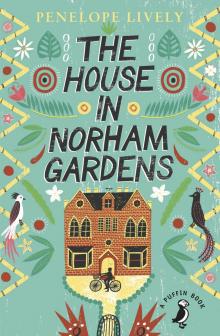 The House in Norham Gardens
The House in Norham Gardens Family Album
Family Album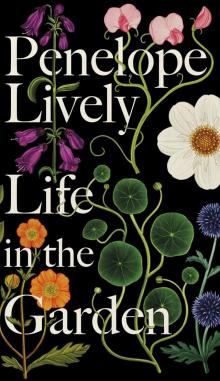 Life in the Garden
Life in the Garden Oleander, Jacaranda: A Childhood Perceived
Oleander, Jacaranda: A Childhood Perceived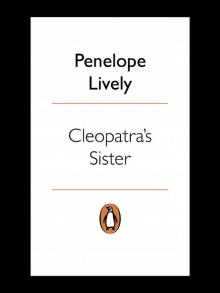 Cleopatra's Sister
Cleopatra's Sister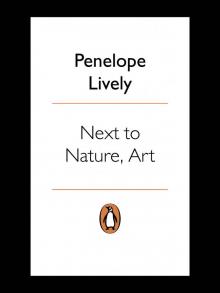 Next to Nature, Art
Next to Nature, Art A Stitch in Time
A Stitch in Time Moon Tiger
Moon Tiger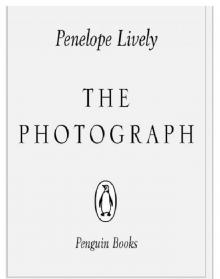 The Photograph
The Photograph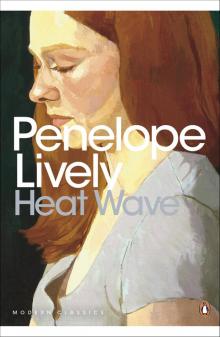 Heat Wave
Heat Wave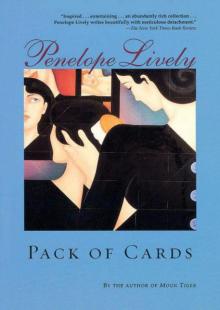 Pack of Cards
Pack of Cards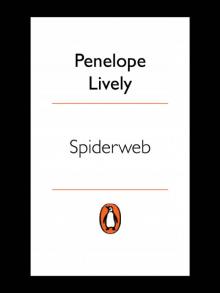 Spiderweb
Spiderweb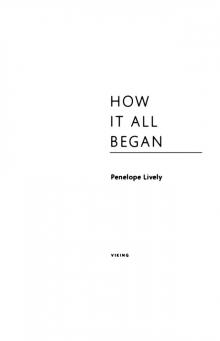 How It All Began
How It All Began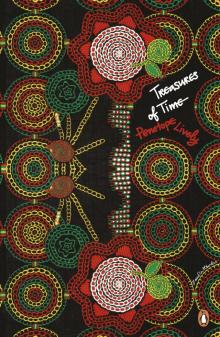 Treasures of Time
Treasures of Time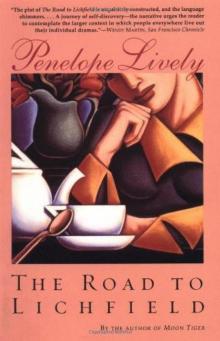 The Road to Lichfield
The Road to Lichfield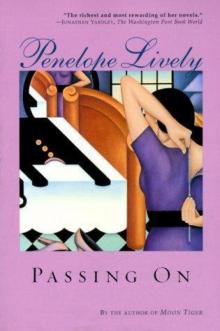 Passing On
Passing On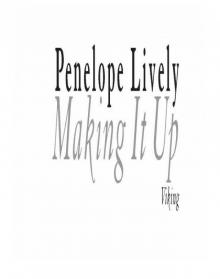 Making It Up
Making It Up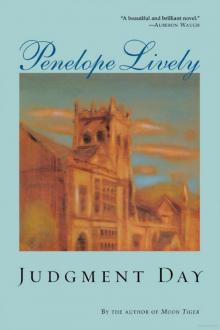 Judgment Day
Judgment Day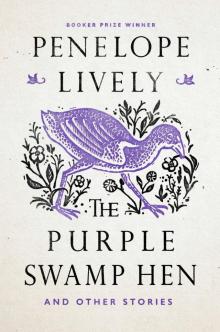 The Purple Swamp Hen and Other Stories
The Purple Swamp Hen and Other Stories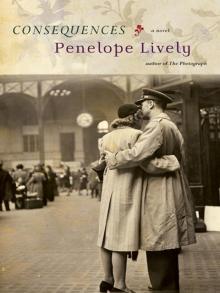 Consequences
Consequences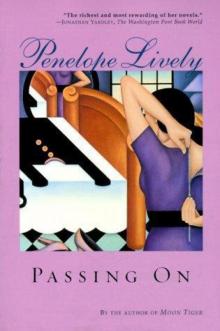 *****Passing On*****
*****Passing On*****